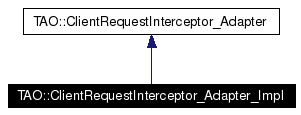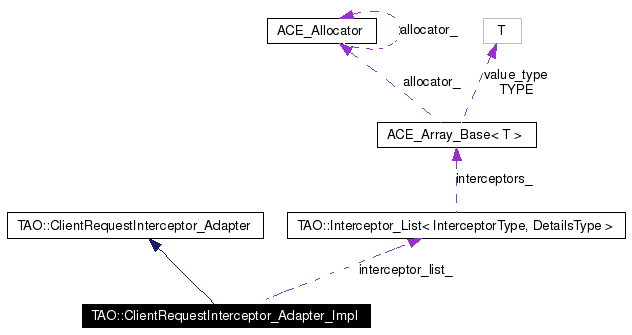
#include <ClientRequestInterceptor_Adapter_Impl.h>
Inheritance diagram for TAO::ClientRequestInterceptor_Adapter_Impl:


Public Member Functions | |
| ClientRequestInterceptor_Adapter_Impl (void) | |
| virtual void | add_interceptor (PortableInterceptor::ClientRequestInterceptor_ptr interceptor) |
| Register an interceptor. | |
| virtual void | add_interceptor (PortableInterceptor::ClientRequestInterceptor_ptr interceptor, const CORBA::PolicyList &policies) |
| Register an interceptor with policies. | |
| virtual void | destroy_interceptors (void) |
| virtual PortableInterceptor::ReplyStatus | reply_status (TAO::Invocation_Base const &invocation_base) |
PortableInterceptor Client Side Interception Points | |
Each of these methods corresponds to a client side interception point. There are no "intermediate" interception points on the client side, only "starting" and "ending" interception points. | |
| virtual void | send_request (Invocation_Base &invocation) |
| virtual void | receive_reply (Invocation_Base &invocation) |
| virtual void | receive_exception (Invocation_Base &invocation) |
| virtual void | receive_other (Invocation_Base &invocation) |
Protected Member Functions | |
| void | process_forward_request (Invocation_Base &invocation, const PortableInterceptor::ForwardRequest &exc) |
Private Attributes | |
| ClientRequestInterceptor_List | interceptor_list_ |
| List of registered interceptors. | |
|
|
Definition at line 10 of file ClientRequestInterceptor_Adapter_Impl.inl.
00011 {
00012 }
|
|
||||||||||||
|
Register an interceptor with policies.
Implements TAO::ClientRequestInterceptor_Adapter. Definition at line 254 of file ClientRequestInterceptor_Adapter_Impl.cpp. References TAO::Interceptor_List< InterceptorType, DetailsType >::add_interceptor(), and interceptor_list_.
00257 {
00258 this->interceptor_list_.add_interceptor (interceptor, policies);
00259 }
|
|
|
Register an interceptor.
Implements TAO::ClientRequestInterceptor_Adapter. Definition at line 247 of file ClientRequestInterceptor_Adapter_Impl.cpp. References TAO::Interceptor_List< InterceptorType, DetailsType >::add_interceptor(), and interceptor_list_.
00249 {
00250 this->interceptor_list_.add_interceptor (interceptor);
00251 }
|
|
|
Implements TAO::ClientRequestInterceptor_Adapter. Definition at line 262 of file ClientRequestInterceptor_Adapter_Impl.cpp. References TAO::Interceptor_List< InterceptorType, DetailsType >::destroy_interceptors(), and interceptor_list_.
00263 {
00264 this->interceptor_list_.destroy_interceptors ();
00265 }
|
|
||||||||||||
|
Process the given PortableInterceptor::ForwardRequest exception, i.e. invoke the receive_other() interception point, in addition to notifying the Invocation object of the LOCATION_FORWARD. Definition at line 236 of file ClientRequestInterceptor_Adapter_Impl.cpp. References PortableInterceptor::ForwardRequest::forward, TAO::Invocation_Base::forwarded_reference(), and receive_other(). Referenced by receive_exception(), receive_other(), and send_request().
00239 {
00240 invocation.forwarded_reference (exc.forward.in ());
00241
00242 // receive_other() is potentially invoked recursively.
00243 this->receive_other (invocation);
00244 }
|
|
|
This method implements one of the "ending" client side interception point. Implements TAO::ClientRequestInterceptor_Adapter. Definition at line 99 of file ClientRequestInterceptor_Adapter_Impl.cpp. References TAO::Invocation_Base::exception, interceptor_list_, TAO::Invocation_Base::is_remote_request(), process_forward_request(), TAO::Interceptor_List< InterceptorType, DetailsType >::registered_interceptor(), reply_status(), and TAO::Invocation_Base::stack_size(). Referenced by receive_other().
00101 {
00102 // This is an "ending" interception point so we only process the
00103 // interceptors pushed on to the flow stack.
00104
00105 bool const is_remote_request = invocation.is_remote_request();
00106
00107 // Notice that the interceptors are processed in the opposite order
00108 // they were pushed onto the stack since this is an "ending"
00109 // interception point.
00110 try
00111 {
00112 TAO_ClientRequestInfo ri (&invocation);
00113
00114 // Unwind the flow stack.
00115 size_t const len = invocation.stack_size ();
00116 for (size_t i = 0; i < len; ++i)
00117 {
00118 // Pop the interceptor off of the flow stack before it is
00119 // invoked. This is necessary to prevent an interceptor
00120 // already invoked in this "ending" interception point from
00121 // being invoked in another "ending" interception point.
00122 --invocation.stack_size ();
00123
00124 ClientRequestInterceptor_List::RegisteredInterceptor& registered =
00125 this->interceptor_list_.registered_interceptor (
00126 invocation.stack_size ());
00127
00128 if (registered.details_.should_be_processed (is_remote_request))
00129 {
00130 registered.interceptor_->receive_exception (&ri);
00131 }
00132 }
00133 }
00134 catch (const ::PortableInterceptor::ForwardRequest& exc)
00135 {
00136 this->process_forward_request (invocation, exc);
00137 }
00138 catch ( ::CORBA::Exception& ex)
00139 {
00140 // The receive_exception() interception point in the remaining
00141 // interceptors must be called so call this method (not the
00142 // interceptor's corresponding method) recursively. The call is
00143 // made recursively since the caught exception must survive
00144 // until the remaining interceptors have been called.
00145
00146 // Note that the recursion will stop once the flow stack size
00147 // drops to zero, i.e., once each interceptor has been invoked.
00148 // This prevents infinite recursion from occuring.
00149
00150 invocation.exception (&ex);
00151
00152 this->receive_exception (invocation);
00153
00154 PortableInterceptor::ReplyStatus status =
00155 this->reply_status (invocation);
00156
00157 // Only re-throw the exception if it hasn't been transformed by
00158 // the receive_exception() interception point (e.g. to a
00159 // LOCATION_FORWARD).
00160 if (status == PortableInterceptor::SYSTEM_EXCEPTION
00161 || status == PortableInterceptor::USER_EXCEPTION)
00162 throw;
00163 }
00164 }
|
|
|
This method implements one of the "ending" client side interception point. Implements TAO::ClientRequestInterceptor_Adapter. Definition at line 167 of file ClientRequestInterceptor_Adapter_Impl.cpp. References TAO::Invocation_Base::exception, interceptor_list_, TAO::Invocation_Base::is_remote_request(), process_forward_request(), receive_exception(), TAO::Interceptor_List< InterceptorType, DetailsType >::registered_interceptor(), reply_status(), and TAO::Invocation_Base::stack_size(). Referenced by process_forward_request().
00169 {
00170 // This is an "ending" interception point so we only process the
00171 // interceptors pushed on to the flow stack.
00172
00173 bool const is_remote_request = invocation.is_remote_request();
00174
00175 // Notice that the interceptors are processed in the opposite order
00176 // they were pushed onto the stack since this is an "ending"
00177 // interception point.
00178
00179 try
00180 {
00181 TAO_ClientRequestInfo ri (&invocation);
00182
00183 // Unwind the stack.
00184 size_t const len = invocation.stack_size ();
00185 for (size_t i = 0; i < len; ++i)
00186 {
00187 // Pop the interceptor off of the flow stack before it is
00188 // invoked. This is necessary to prevent an interceptor
00189 // already invoked in this "ending" interception point from
00190 // being invoked in another "ending" interception point.
00191 --invocation.stack_size ();
00192
00193 ClientRequestInterceptor_List::RegisteredInterceptor& registered =
00194 this->interceptor_list_.registered_interceptor (
00195 invocation.stack_size ());
00196
00197 if (registered.details_.should_be_processed (is_remote_request))
00198 {
00199 registered.interceptor_->receive_other (&ri);
00200 }
00201 }
00202 }
00203 catch (const ::PortableInterceptor::ForwardRequest& exc)
00204 {
00205 this->process_forward_request (invocation, exc);
00206 }
00207 catch ( ::CORBA::Exception& ex)
00208 {
00209 // The receive_exception() interception point in the remaining
00210 // interceptors must be called so call this method (not the
00211 // interceptor's corresponding method) recursively. The call is
00212 // made recursively since the caught exception must survive
00213 // until the remaining interceptors have been called.
00214
00215 // Note that the recursion will stop once the flow stack size
00216 // drops to zero, i.e., once each interceptor has been invoked.
00217 // This prevents infinite recursion from occuring.
00218
00219 invocation.exception (&ex);
00220
00221 this->receive_exception (invocation);
00222
00223 PortableInterceptor::ReplyStatus status =
00224 this->reply_status (invocation);
00225
00226 // Only re-throw the exception if it hasn't been transformed by
00227 // the receive_exception() interception point (e.g. to a
00228 // LOCATION_FORWARD).
00229 if (status == PortableInterceptor::SYSTEM_EXCEPTION
00230 || status == PortableInterceptor::USER_EXCEPTION)
00231 throw;
00232 }
00233 }
|
|
|
This method implements one of the "ending" client side interception point. Implements TAO::ClientRequestInterceptor_Adapter. Definition at line 59 of file ClientRequestInterceptor_Adapter_Impl.cpp. References interceptor_list_, TAO::Invocation_Base::is_remote_request(), TAO::Interceptor_List< InterceptorType, DetailsType >::registered_interceptor(), and TAO::Invocation_Base::stack_size().
00061 {
00062 // This is an "ending" interception point so we only process the
00063 // interceptors pushed on to the flow stack.
00064
00065 bool const is_remote_request = invocation.is_remote_request();
00066
00067 // Notice that the interceptors are processed in the opposite order
00068 // they were pushed onto the stack since this is an "ending"
00069 // interception point.
00070
00071 TAO_ClientRequestInfo ri (&invocation);
00072
00073 // Unwind the stack.
00074 size_t const len = invocation.stack_size ();
00075 for (size_t i = 0; i < len; ++i)
00076 {
00077 // Pop the interceptor off of the flow stack before it is
00078 // invoked. This is necessary to prevent an interceptor already
00079 // invoked in this "ending" interception point from being
00080 // invoked in another "ending" interception point.
00081 --invocation.stack_size ();
00082
00083 ClientRequestInterceptor_List::RegisteredInterceptor& registered =
00084 this->interceptor_list_.registered_interceptor (
00085 invocation.stack_size ());
00086
00087 if (registered.details_.should_be_processed (is_remote_request))
00088 {
00089 registered.interceptor_->receive_reply (&ri);
00090 }
00091 }
00092
00093 // The receive_reply() interception point does not raise a
00094 // PortableInterceptor::ForwardRequest exception so there is no need
00095 // to attempt to catch it here.
00096 }
|
|
|
Implements TAO::ClientRequestInterceptor_Adapter. Definition at line 268 of file ClientRequestInterceptor_Adapter_Impl.cpp. References TAO::Invocation_Base::invoke_status(), and TAO::Invocation_Base::is_forwarded(). Referenced by receive_exception(), and receive_other().
00270 {
00271 PortableInterceptor::ReplyStatus reply_status;
00272
00273 switch (invocation_base.invoke_status ())
00274 {
00275 case TAO::TAO_INVOKE_SUCCESS:
00276 reply_status = PortableInterceptor::SUCCESSFUL;
00277 break;
00278 case TAO::TAO_INVOKE_RESTART:
00279 if (invocation_base.is_forwarded ())
00280 reply_status = PortableInterceptor::LOCATION_FORWARD;
00281 else
00282 reply_status = PortableInterceptor::TRANSPORT_RETRY;
00283 break;
00284 case TAO::TAO_INVOKE_USER_EXCEPTION:
00285 reply_status = PortableInterceptor::USER_EXCEPTION;
00286 break;
00287 case TAO::TAO_INVOKE_SYSTEM_EXCEPTION:
00288 reply_status = PortableInterceptor::SYSTEM_EXCEPTION;
00289 break;
00290 default:
00291 reply_status = PortableInterceptor::UNKNOWN;
00292 break;
00293 }
00294
00295 return reply_status;
00296 }
|
|
|
This method implements one of the "starting" client side interception points. Implements TAO::ClientRequestInterceptor_Adapter. Definition at line 25 of file ClientRequestInterceptor_Adapter_Impl.cpp. References interceptor_list_, TAO::Invocation_Base::is_remote_request(), process_forward_request(), TAO::Interceptor_List< InterceptorType, DetailsType >::registered_interceptor(), TAO::Interceptor_List< InterceptorType, DetailsType >::size(), and TAO::Invocation_Base::stack_size().
00027 {
00028 // This method implements one of the "starting" client side
00029 // interception point.
00030
00031 bool const is_remote_request = invocation.is_remote_request();
00032
00033 try
00034 {
00035 TAO_ClientRequestInfo ri (&invocation);
00036
00037 for (size_t i = 0 ; i < this->interceptor_list_.size (); ++i)
00038 {
00039 ClientRequestInterceptor_List::RegisteredInterceptor& registered =
00040 this->interceptor_list_.registered_interceptor (i);
00041
00042 if (registered.details_.should_be_processed (is_remote_request))
00043 {
00044 registered.interceptor_->send_request (&ri);
00045 }
00046
00047 // The starting interception point completed successfully.
00048 // Push the interceptor on to the flow stack.
00049 ++invocation.stack_size ();
00050 }
00051 }
00052 catch (const ::PortableInterceptor::ForwardRequest& exc)
00053 {
00054 this->process_forward_request (invocation, exc);
00055 }
00056 }
|
|
|
List of registered interceptors.
Definition at line 121 of file ClientRequestInterceptor_Adapter_Impl.h. Referenced by add_interceptor(), destroy_interceptors(), receive_exception(), receive_other(), receive_reply(), and send_request(). |
 1.3.6
1.3.6